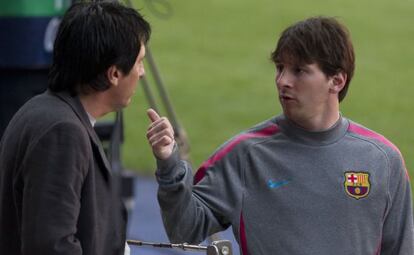Messi charity games investigated for link to drug traffickers
Organized crime officers probe potential money laundering surrounding series of friendly matches in the Americas

The Civil Guard’s UCO organized crime unit is investigating whether six charity soccer matches, called Messi and friends versus the Rest of the World, were used by drug traffickers to launder money. The games under the microscope took place in June 2012 across Latin America and North America. Appearing alongside Argentina star Messi were his Barcelona teammates Dani Alves, José Manuel Pinto and Javier Mascherano. The investigation has so far reaped four arrests.
The Barcelona players were questioned by the UCO on November 29, not because there is any suspicion of their involvement in money laundering but to ask what they know about the charity matches they played in and whether or not they were paid to appear. Messi told investigators that matches in the series were staged in Bogota, Peru, Cancún, Miami and Chicago, promoted by Imagen Deportiva, a company run by Argentinean Guillermo Marín. Total Conciertos, another company under suspicion, is managed by two targets of the inquiry, Andrés Barco and Harrison González.
How does the UCO believe the money was laundered? In these matches, on top of ticket sales, there is the so-called row zero, through which donations can be made. Investigators believe Colombian drug traffickers may have run cash through the donation initiative, with the connivance of the organizers of the games.
Messi told the UCO that he didn’t know if any of his family met with Barco when the latter traveled to Spain to prepare the events. He did confirm that Marín organizes the games for the Leo Messi Foundation, but that he had no business links to his countryman. Messi said that his foundation received money from the Bogota match, which was destined for NGOs. He added that his father, Jorge Messi, was the intermediary between his foundation and Marín. The UCO intends to question Messi’s father when he returns from Argentina after Christmas.
Tickets for the Bogota match were the most expensive in Colombia’s history, ranging from 39 to 490 euros
Alves, Pinto and Mascherano said that their travel and accommodation was provided for but they were not paid to appear in the matches.
The investigation is focusing on matches played on June 21 and 23, 2012, in Bogota and Miami. The Bogota match was organized by Total Conciertos, with the profits supposedly destined for various charitable foundations — but these have denounced that the money never reached them. Furthermore, a suspect in the investigation made a statement describing the charity matches as a farce. They were merely “a hook,” he added.
According to the UCO, which recorded telephone conversations, the Bogota match raked in three million euros for the Leo Messi Foundation and further sums for other NGOs. In order to qualify for money raised by the soccer matches, charitable organizations had to sign up on a website, from where two were selected. These then had to pick which team would win. The foundation that picked the winning side would receive 85 million pesos (almost 32 million euros) while the loser would receive 15 million pesos (5.6 million euros), on top of the money from Messi’s organization. A photograph taken at the game shows Messi and Barco in the middle of the pitch with huge checks showing both amounts. One of the NGOs that was chosen, Benposta Interval, a Spain-based children’s charity, has said the promised money never arrived.
Barco said later that some of the money went to paying players an appearance fee, and confirmed that money was still owed to Benposta Interval.
Tickets for the Bogota match were the most expensive in Colombia’s history, ranging from 39 to 490 euros. Investigators have highlighted the bad organization and lack of control over finances surrounding the match, and suspect this may be a form of camouflage to obscure money-laundering activity.
Messi and his father were also investigated this year on suspicion of tax fraud. The player paid five million euros in back taxes and is currently negotiating an end to the case.
Tu suscripción se está usando en otro dispositivo
¿Quieres añadir otro usuario a tu suscripción?
Si continúas leyendo en este dispositivo, no se podrá leer en el otro.
FlechaTu suscripción se está usando en otro dispositivo y solo puedes acceder a EL PAÍS desde un dispositivo a la vez.
Si quieres compartir tu cuenta, cambia tu suscripción a la modalidad Premium, así podrás añadir otro usuario. Cada uno accederá con su propia cuenta de email, lo que os permitirá personalizar vuestra experiencia en EL PAÍS.
¿Tienes una suscripción de empresa? Accede aquí para contratar más cuentas.
En el caso de no saber quién está usando tu cuenta, te recomendamos cambiar tu contraseña aquí.
Si decides continuar compartiendo tu cuenta, este mensaje se mostrará en tu dispositivo y en el de la otra persona que está usando tu cuenta de forma indefinida, afectando a tu experiencia de lectura. Puedes consultar aquí los términos y condiciones de la suscripción digital.








































